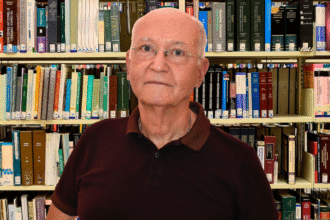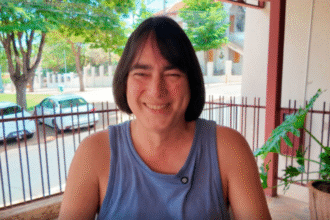Bancroft Press is pleased to present “Running Mates” by Emily Locker , a contemporary romance that promises to delight readers this Valentine’s Day 2024. In a plot reminiscent of the Romeo and Juliet classics, Locker explores themes of love, friendship and reconciliation in a divided world. When Annabelle Morningstar and Gabe Delgado, two young people from opposing political backgrounds, fall in love in the midst of a polarized city, they face the challenge of reconciling their differences while discovering common ground. With an engaging and timely narrative, “Running Mates” promises to be a captivating read that goes beyond the conventional boundaries of romance.
What inspired you to write ‘Running Mates,’ and how did you approach crafting a love story amidst political differences?
I am a life-long lover of romantic comedies. So I couldn’t imagine writing a novel in any other genre. For me, especially in a time of so much uncertainty, the escapist element of a happily-ever-after story feels more vital than ever. I was born and raised in Washington DC and thus have always been surround by politics. But it wasn’t until I moved back to DC as an adult that the idea for Running Mates crystalized. In my son’s nursery class we had one parent who had been a speech writer for President Obama and another parent who had been a speech writer for Mike Pence (Donald Trump’s Vice President). At first I wondered, how is this going to work? But then I watched them at various family events and parent-only outings throughout the year and they got along swimmingly! When people are brought together, in my case, by their children or, in Anna and Gabe’s case, by running, we tend to see our similarities much more clearly than our differences.
The protagonists, Annabelle and Gabe, come from opposing political backgrounds. How did you develop these characters so that readers could connect with both, regardless of their own political views?
I tried to focus on the qualities in each of them that made the character unique. For Anna this is her quirky spirit and outspoken nature. For Gabe this is his innate kindness and sensitivity. I also tried to give them characteristics that you wouldn’t stereotypically find in a liberal or conservative caricature. I wanted both sides to feel sympathetic, which wasn’t always easy. I approached this by trying to be thoughtful and careful in what issues I chose to represent and nuanced in the ways Anna and Gabe responded to them. I think most people can tolerate and even embrace nuance, but the media and political world we live in pushes us towards extremes.
Given the political nature of the story, ‘Running Mates’ touches on contemporary themes. How do you view the ability of fictional stories, especially those with political nuances, to influence or reflect on current society?
I think fiction often has the freedom to comment on society in a way other mediums cannot. By adding a romantic and humorous love story to the mix, readers get swept into Anna and Gabe’s world, enveloped in themes and ideas that might be less palatable if presented on the news, in a class at school, or just on a TikTok video. One theme I really explore through the book is how much our personal views are shaped by our family and friends. Teenage years are supposed to be about forming an independent identity, and that makes it the perfect backdrop for this commentary.
Annabelle and Gabe face the challenge of reconciling their polarized upbringings. Does this reflect any personal experience of yours, or is it an imaginative exploration of political and social dynamics?
Although it was not nearly as dramatic as Anna and Gabe’s story, I had this experience with one of my first (and to this day dearest ) friends I made when I first moved to New York City in my twenties. I was an east coast Jewish girl who grew up with a lot of like-minded people, and my friend grew up in a very conservative Christian household in the midwest. We actually met while working in a bookstore right out of college. At the time, I couldn’t have imagined being friends with someone who thought about the world so differently than I did, and vice versa. But we were, in the words of Anne of Green Gables, true kindred spirits. Since we worked together, we kept being forced to interact, learn to trust each other, and find common ground. That led to a deep and enriching friendship for which I am so grateful!
You mentioned that ‘Running Mates’ is ideal for readers seeking a captivating story that goes beyond the ordinary. How do you hope the book will resonate with the audience and potentially influence their perspectives?
When I am not writing, I work as a psychotherapist. I see so many of my clients struggle with how to handle relationships in an image-focused, identity-centric, polarized climate. I have seen multiple friendships end over what people put on their Instagram feed. I am hoping Running Mates resonates with those who fear they can’t be friends with people who think differently. So much opportunity for growth is lost when we are only around people who talk and think just like us.

Your work is described as a contemporary take on the classic Romeo and Juliet story. What classic romance elements did you find essential to incorporate, and how did you adapt them for a modern narrative?
The most classic romance element is the sense of “fated mates” to quote the (real) podcast Anna listens to during her first run-in with Gabe. I hoped to present the two protagonists as meant-to-be, in a profound way, through a chemistry readers can feel. The other absolutely classic romance element is a swoon-worthy lead, and Gabe is definitely that! The modern take is definitely how the Elephants and Donkeys are the modern day Capulets and Montagues.
‘Running Mates’ explores themes of identity and coming-of-age in a polarized world. Can you share how these themes intertwine in the story and why they are crucial for the characters?
So often in today’s world we see teenagers and young adults (and frankly adults as well!) shape their identities through very specific, narrow lenses. Their politics become such a huge part of their identity that it can dictate everything from what they read to what they wear. Often we make choices because someone whom we think represents what we believe – whether that is from the left or right – told us to do that, buy this, wear that. A good example is when Anna thinks she is supposed to like a play she actually hates and finds silly. I think this phenomenon interferes with how we all grow, explore our identities and come into our own.
The politically divided town of Edgartown, North Carolina, plays a significant role. How does the choice of this specific setting contribute to the plot and the overall atmosphere of the story?
It is literally a town divided! The Northside has big box luxury stores, and the Eastside has independent, niche shops. I use the town to highlight the divide in our larger nation and also poke a little fun at stereotypes of the left and right.
The characters share a deep love for their community. How did you build this sense of community in the narrative, and why is it central to the protagonists’ journey?
Small towns are such great portrait to show the ties that bind us. High school students especially have so many mini-communities inside their larger ones. For example, at the largest level for Anna and Gabe is the community of the town itself, the shops and running trails and other places the residents frequent. From there we get smaller mini communities inside their high school: sports teams, extracurricular clubs, and tight-knit friend groups. I made sure to highlight how Anna and Gabe both interact with and care about everything from the topography of Edgartown to their personal relationships with their parents, teammates and friends.
If you could convey a specific message to readers of ‘Running Mates,’ especially considering its release on Valentine’s Day 2024, what would it be?
That love can be powerful, delightful, and fun; that love can transcend boundaries; that differences can be our biggest strengths and even bring us closer together.
Follow Emily Locker on Instagram





